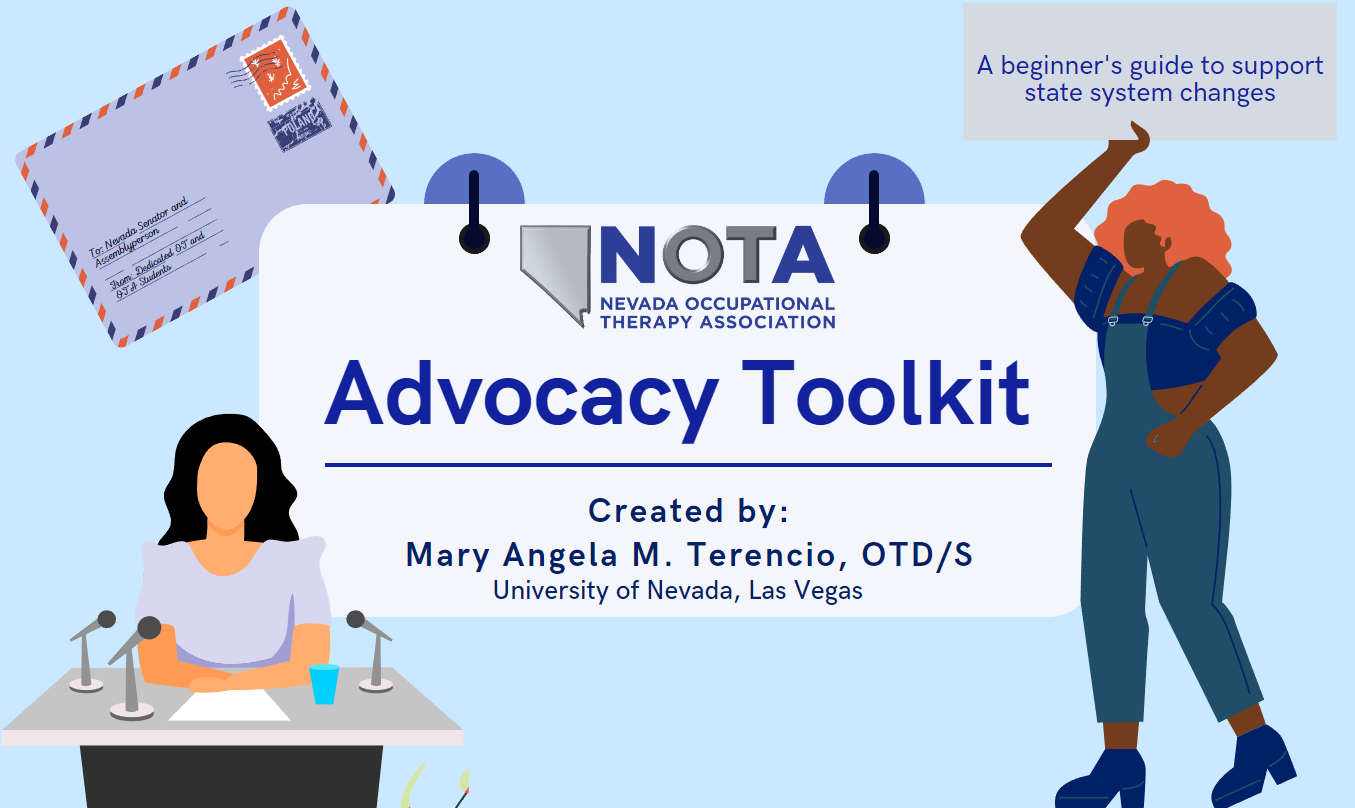Advocacy
Regulatory
| Legislative
| Workplace Issues
|
QMHP EffortsQualified Mental Health Practitioner (QMHP)
|
OT Compact
|
Get Involved Nevada Board of Occupational Therapy 6170 Mae Ann Ave., Suite 1 Reno, NV 89523 Notice of Public Hearing April 6, 2023 at 1 PM Review regulations in its entirety to identify at least 10 regulations for removal Written submissions must be received on or before March 31, 2023 by email or in hard copy Accreditation Council for Occupational Therapy Education (ACOTE) Call for Comment on Draft ACOTE Standards and Notice of Open Hearing April 21, 2023 from 1 PM to 2:30 PM Comment on the first draft of the revised ACOTE standards for doctoral and master's degree for OT, and baccalaureate and associate degree for OTA programs. Provide feedback through the survey or email View the drafted standards here > Build a Relationship with your NV Representatives Share your voice and write or email your representatives! Use this letter template to build a relationship with government leaders and introduce yourself and your profession. | Advocacy Toolkit Now live!!! Click on this link or the image above to learn more about systems-level advocacy. |
Federal Issues
From AOTA's Legislative Action Center. Visit it today to contact your policy makers from home! There are templates to connect you with your reps on the following:
SMART Act (H.R.5536)
Ask Congress to Support the SMART Act to Protect Access to Services Provided by Occupational Therapy Assistants. The “Stabilizing Medicare Access to Rehabilitation and Therapy Act” or SMART Act (H.R. 5536) was introduced by Reps. Bobby Rush (D-IL) and Jason Smith (R-MO) in the United States House of Representatives. This legislation would mitigate the impact of a 15% cut to Medicare Part B services provided by occupational therapy assistants, which went into effect in January 2022. These cuts may leave many seniors—especially those in underserved and rural areas—with less access to critical occupational therapy services.
OT in Mental Health Parity Act (S. 4712)
Ask your Legislators to Support to OT Mental Health Parity Act! This bill, introduced in the Senate by Sen. Maggie Hassan (D-NH) and Sen. Tim Scott (R-SC) would expand access to OT services for mental and behavioral health disorders without changing current Medicare and Medicaid benefits or scope of services. This bill would help Medicare and Medicaid recipients more readily access occupational therapy services for behavioral health challenges affecting functional skills and help address the current shortage of behavioral health professionals.
Expanded Telehealth Access Act (H.R. 2168/S. 3193)
Ask Congress to Support the Expanded Telehealth Access Act. The use of telehealth to provide a wide array of healthcare services including OT has grown exponentially during the Public Health Emergency (PHE), and this has been of great benefit to Medicare beneficiaries who otherwise would have lost access to services. It has been even more beneficial for people in rural and other underserved areas and to those for whom travel to receive services was already a barrier to access including people with disabilities. OTs report that telehealth has reduced delays to care while making it easier to connect with beneficiary caregivers and enabling easier identification of home safety issues. This can be crucial in preventing falls, addressing functional decline, and avoiding costly emergency room visits and hospital admissions - which in turn can reduce the cost of care.
CMS has expressed an eagerness to implement permanent changes to ensure that telehealth services are not abruptly ended when the PHE ends; however, CMS has also noted that Congressional action is needed before it can allow OT and other therapy services to be provided to Medicare beneficiaries by OTs and other therapists after the PHE.
GROW SISPS Act (H.R. 7219)
Urge Your Representative to Co-Sponsor the GROW SISPs Act! The staff shortages faced by our schools prior to the pandemic has become a full-blown crisis. Congress must prioritize efforts to ensure schools have an adequate staff of Specialized Instructional Support Personnel (SISP), a group of school professionals that include occupational therapy practitioners. The GROW SISPS Act would create the first ever grant program with the goal of recruiting and training existing school staff to get the necessary education, experience, and skills to become a fully licensed or certified SISP, such as an occupational therapy practitioner.
Resetting the Impact Act (H.R. 2455)
Ask Congress to Support the Resetting the Impact Act! The Resetting the Impact Act, H.R. 2455, would "reset" the development of a unified post-acute care payment system, to ensure these efforts use the most recent data from new post-acute payment systems (i.e., PDPM and PDGM). This would also provide time to understand "lessons learned" from PDGM and PDPM. Additionally, resetting the data-collection will help account for the long-term effects of the COVID pandemic.
Developing a unified post-acute care payment system based on old information and data could lead to a payment system that does not appropriately value occupational therapy services and prevent Medicare beneficiaries from getting medically necessary occupational therapy services. Write to your Representative and ask them to co-sponsor H.R. 2455.
Prepare for and Respond to Existing Viruses, Emerging New Threats (PREVENT) Pandemics Act (S.3799)
Ask your Legislators to Support the Prevent Pandemics Act which Includes the Allied Health Workforce Diversity Act! The PREVENT Pandemics Act includes proposals to begin or expand a wide range of initiatives to respond to pandemics. One of these initiatives included in the PREVENT Pandemics Act would create the program first proposed by the Allied Health Workforce Diversity Act (H.R. 3320/S. 1679). First introduced by Reps. Bobby Rush (IL-01) and Markwayne Mullin (OK-02) in the House, and Sens. Bob Casey (PA), and Lisa Murkowski (AK) in the Senate, the Allied Health Workforce Diversity Act would provide much needed support to increase opportunities for individuals who are from underrepresented backgrounds, including students from racial and ethnic minorities, in the professions of occupational therapy, physical therapy, respiratory therapy, speech language pathology, and audiology. The program proposed in this bill would support higher education programs for these allied health professions.
Stop Medicare Payment Cuts Proposed for 2023
Contact your Legislators today and ask Congress to: Stop these cuts and provide an inflationary increase for 2023 & Work to reform the flawed MPFS.
The 2023 Medicare Physician Fee Schedule (MPFS) includes payment cuts to multiple healthcare provider specialties. The 4.42% cut to the fee schedule’s conversion factor would be in addition to reductions in 2020 and 2021. The main driver of these cuts is the “budget-neutrality” requirement for the MPFS, which requires an increase in one service to be offset with reductions elsewhere. These “budget-neutrality” cuts are causing significant disruption to the health care system, and are implemented by mathematical formula, without regard to patient outcomes, provider resource needs, or any other policy. Additionally, unlike other Medicare payment systems, the PFS does not receive an automatic inflationary increase – meaning the base rate of payment has barely increased since 2016.
Lymphedema Treatment Act (S.1315)
Voice your support for the Lymphedema Treatment Act! The Lymphedema Treatment Act is expected to be voted on and passed by the U.S. House of Representatives, but the Senate still has to act in order for it to be signed into law by the end of the year. This bill, H.R. 3630/The Lymphedema Treatment Act is expected to be voted on and passed by the U.S. House of Representatives, but the Senate still has to act in order for it to be signed into law by the end of the year. This bill, H.R. 3630/S. 1315, would add compression supplies - used to treat lymphedema - to the list of Medicare covered supplies. These medically necessary, doctor prescribed supplies, are vital to effective lymphedema treatment, but are not currently covered under Medicare., would add compression supplies - used to treat lymphedema - to the list of Medicare covered supplies. These medically necessary, doctor prescribed supplies, are vital to effective lymphedema treatment, but are not currently covered under Medicare.


